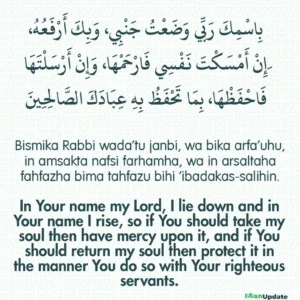Dua of Arafah: Everything You Need to Know

The Day of Arafah, the ninth day of Dhul-Hijjah, holds immense significance in Islam. Many scholars have highlighted it as one of the best days in the Islamic calendar, especially within the blessed first ten days of Dhul-Hijjah. In this article, we will explore the importance of Arafah and delve into the powerful Dua of Arafah.
What is Arafah in Islam?
Arafah is the ninth day of Dhul-Hijjah, known as the Day of Arafah. It is part of the first ten days of Dhul-Hijjah, which are the greatest days of the year, as noted in several Islamic teachings. The Prophet Muhammad (PBUH) and previous prophets emphasized the profound blessings of this day.
Dua of Arafah in Arabic
The Dua for the Day of Arafah is recited as:
لاَ إِلَهَ إِلاَّ اللهُ، وَحْدَهُ لاَ شَرِيكَ لَهُ، لَهُ المُلكُ، وَ لَهُ الحَمدُ، وَ هُوَ عَلَى كُلِّ شَيءٍ قَدِيرٌ
Transliteration
This dua can be transliterated as:
La ilaha illallahu wahdahu la shareeka lah, lahul-mulku walahul-hamdu wahuwa ‘ala kuli shay-in qadeer.
Dua of Arafah Meaning in English
The meaning of this dua is:
There is no true God worthy of being worshipped except Allah, alone, without any partners. To Him belongs the Kingdom, and all-praise is due to Him, and He is able to do all things.
The Importance of the Dua of Arafa
The Dua of Arafah is one of the most significant supplications in Islam. The Prophet Muhammad (PBUH) said, as narrated by ‘Amr ibn Shu’ayb:
“The best supplication is the one made on the Day of Arafah. The best of it is what I and the previous prophets have said: ‘There is no God but Allah alone, without any partners, unto Him belongs the dominion and all praise, and He has power over all things.’”
(Source: Sunan al-Tirmidhī 3585; Grade: Hasan by Al-Albani)

Virtues of the Dua of Arafah
The Prophet (PBUH) emphasized that the best dua of the year is the dua made on the Day of Arafah. This dua encapsulates the essence of the message brought by all prophets — the pure and absolute monotheism of Allah (Tawheed).
Reciting this dua is not only a call to Allah, the One Creator, but also an acknowledgment of His greatness. Before making any personal supplications, one should praise Allah, recognize His attributes, and call upon Him sincerely.
READ ALSO: 6 Dua Iftitah (Dua Istiftah) in Arabic, Transliteration & Meaning
The Daily Power of This Dua
The Prophet (PBUH) taught that even outside the Day of Arafah, this dua holds great power. He would recite it 100 times each day, teaching that whoever does so will receive protection from Shaytaan for the rest of the day.
Before beginning any personal prayers on Arafah, start with this dua, and increase your prayers and salutations (salawat) upon the Prophet Muhammad (PBUH). He said that a supplication is cut off if no salawat is made.
Personalizing Your Dua on the Day of Arafah
While the Dua of Arafah is the best supplication, it is also highly recommended to make personalized prayers. On this day, write down what you want to ask from Allah for yourself, your family, and the entire Ummah. The more heartfelt and personalized your dua, the more powerful it becomes.
Allah’s Mercy on the Day of Arafah
The Day of Arafah is a time when Allah’s mercy and forgiveness are most abundant. It is narrated that Allah expresses pride in His servants gathered at Arafah, saying to His angels: “Look at My slaves who have come to Me disheveled and dusty.” (Ahmad, sahih by al-Albani).
Fasting on the Day of Arafah
Fasting on the Day of Arafah carries immense rewards. Abu Qatadah (RA) narrated that the Prophet (PBUH) was asked about fasting on Arafah and he replied: “It expiates for the past and coming years.” (Muslim 1162).
This means fasting on this day can wipe away the sins of two years, making it a powerful opportunity for spiritual purification.
Acts to Do on the Day of Arafah
For those who are not performing Hajj, there are several ways to make the most of this blessed day:
- Fasting: As mentioned, fasting on Arafah expiates the sins of two years. Prioritize this act of worship if you are able.
- Salah (Obligatory Prayers): Make your fard (obligatory) prayers a top priority. Perfect your wudu, pray on time, and in congregation if possible. Focus on khushu’ (humility and concentration) in your prayers.
- Recite Tahleel, Takbeer, Tahmeed, and Tasbeeh: These forms of dhikr are highly recommended.
- Tahleel: La ilaha ilallah (There is no god but Allah)
- Takbeer: Allahu Akbar (Allah is the Greatest)
- Tahmeed: Alhamdulillah (All praise is due to Allah)
- Tasbeeh: Subhanallah (Glory be to Allah)
- Make Lots of Dua: Write down all your duas and ask Allah for both worldly and spiritual blessings. On this day, Allah frees more people from Hellfire than on any other day.
- Recite the Quran: Dedicate time to reading and reflecting on the Quran. The Prophet (PBUH) said the Quran will come as an intercessor on the Day of Judgment for those who recite it.
- Be Extra Kind to Your Parents: The Prophet (PBUH) said that after salah, the next best deed is kindness to parents. On this day, go out of your way to respect, serve, and be gentle with them.
- Give Charity: Giving in charity is among the most beloved deeds to Allah. This can be monetary or through small acts of kindness such as helping someone in need or easing another’s burden.
Conclusion
The Day of Arafah is one of the most significant and rewarding days in Islam. It offers unparalleled opportunities for spiritual growth, forgiveness, and mercy. Whether you are fasting, engaging in dua, or giving charity, make sure to take full advantage of the blessings of this day.
May Allah accept our good deeds, forgive our sins, and grant us success in this life and the hereafter.





